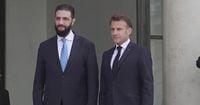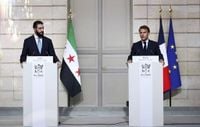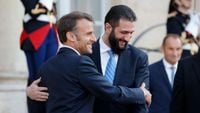On Wednesday, May 7, 2025, French President Emmanuel Macron welcomed interim Syrian President Ahmed al-Charaa to the Élysée Palace, marking a controversial first visit to the West for the new Syrian leader. This meeting comes at a time when violence against minority groups in Syria continues, raising significant concerns among various political factions in France.
Macron's reception of al-Charaa, who previously held key positions in jihadist groups such as Hayat Tahrir al-Sham, has sparked outrage, particularly from the far-right and conservative parties in France. Marine Le Pen, leader of the National Rally, expressed her "stupefaction and consternation," stating, "We do not receive leaders who are former terrorists, members of organizations that want to attack France." Similarly, Laurent Wauquiez, head of the Republicans in the National Assembly, described the meeting as a "serious error," emphasizing that al-Charaa's past raises serious ethical questions.
During the joint press conference following their meeting, Macron reiterated the international community's expectations for the Syrian government, stressing the need for the protection of minorities and respect for fundamental rights. He stated, "You must do everything possible to ensure the protection of all Syrians without exception, regardless of their origin, religion, or beliefs." This call comes in the wake of recent massacres in Syria that resulted in 1,700 deaths, primarily among the Alawite minority.
Macron also urged the European Union to "systematically sanction the perpetrators of crimes" in Syria, while advocating for a gradual lifting of economic sanctions starting in June. He appealed to the United States to align with this approach and delay the announced withdrawal of troops currently stationed in Syria as part of the fight against the Islamic State.
Al-Charaa, for his part, attempted to reassure the international community, stating, "The security of all Syrians is our priority," and rejecting any notion of sectarian conflict within the country. He presented himself as "a reliable partner in the fight against terrorism," a stance he hopes will facilitate the easing of sanctions that he claims have "no justification" given the dire economic conditions in Syria, where 90% of the population lives below the poverty line according to the UN.
The visit was met with protests in Paris, where dozens of individuals from various Syrian religious minorities gathered to voice their dissent. Protesters shouted, "Get out! Get out of France, get out of Syria," expressing their anger over al-Charaa's invitation. Many carried photographs of relatives who had been killed in the recent violence, which has raised doubts about the new government's ability to maintain order.
Issa Ali, president of the Franco-Alawite Collective, accused al-Charaa of being responsible for "genocide and ethnic cleansing," calling Macron's invitation "unacceptable." This sentiment was echoed by UDR deputy Marc Chavent, who remarked, "A terrorist in a tie remains a terrorist," highlighting the deep mistrust among the Syrian diaspora regarding al-Charaa's leadership.
Macron defended his decision to meet with al-Charaa, stating that it is essential to engage with the new Syrian leadership to ensure a transition towards a stable and democratic Syria. He dismissed the criticisms from the right and far-right as mere political posturing aimed at appealing to their respective electorates. Macron remarked, "What I see is a leader in place who has ended a regime we condemned and fought against, and he is ready to engage. The initial actions have led to results."
Despite the backlash, Macron's administration remains committed to facilitating dialogue with the new Syrian government, asserting that failing to do so would be irresponsible, especially given the broader geopolitical implications involving terrorism, migration, and regional stability.
As the situation in Syria continues to evolve, the international community watches closely to see how the new regime will navigate the complexities of governance, particularly in light of the ongoing violence and humanitarian crises. The challenges ahead for al-Charaa's government are immense, and the road to reconciliation and peace remains fraught with difficulties.
In conclusion, Macron's meeting with al-Charaa represents a significant moment in French foreign policy, balancing the need for diplomatic engagement with the moral imperative to uphold human rights and protect vulnerable populations in Syria. The reactions from various political factions in France highlight the contentious nature of this engagement, reflecting deep divisions over how best to address the complexities of the Syrian conflict.



